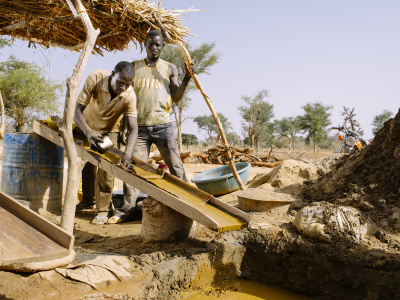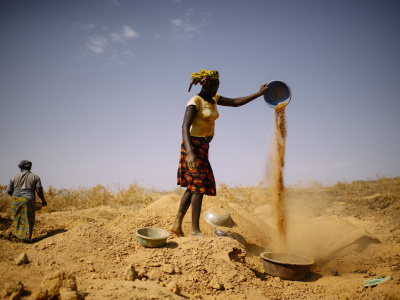
On the political economy of reforms in the extractive sector
Poor or inappropriate policies, governance and institutional structures have commonly been blamed for the resource curse that plagues so many developing countries. Instead of focusing on mainly technical remedies, more effort should be dedicated to designing reforms that are incentive-compatible with key stakeholders that can drive or hinder such reforms, and to promoting initiatives that can enhance domestic incentives towards a pro-development path in resource-rich countries.
When properly managed, natural resources can effectively contribute to sustainable and equitable development. Yet too often, resource-rich countries have failed to capitalise on the benefits and transformative potential of their natural endowment.
The poor performance of some resource-rich countries can be explained by a number of economic factors, including possible negative effects through the terms of trade, the cyclical long term price fluctuation of commodities, short term high price volatility of commodities, the crowding out of manufacturing and the Dutch disease, according to which the natural resources sector grows at the expense of manufacturing, and associated notably with real exchange rate appreciation. Poor macroeconomic management and budgetary processes, as well as the absence of coherent long-term strategic approaches, policies and mechanisms are other common factors.
Power relations and institutional settings also often explain the resource curse. Natural resources create rents, which affect incentives and behaviour of political and economic actors. Political elites play a central role in the collection and allocation of these rents and the distribution of revenues generated directly and indirectly by the exploitation of natural resources. Accordingly, they may pursue self-interest objectives rather than development goals in the management of natural resources, and thus capture these rents. Economic actors are also more likely to engage in wasteful rent-seeking activities, thus diverting resources away from the productive sector.
Rents in turn affect the economic structure, political framework, institutional setting and power relations within a country, particularly where patronage prevails.
Foreign partners, governments or companies, in the pursuit of their own interests, have also at times contributed to reinforce these negative tendencies and the associated resource curse.
The competition for the control and allocation of natural resources and the revenues they generate may lead to political instability, conflicts and authoritarian regimes.
In other words, power relations, politics and governance matters a great deal!
Trying to become more like Norway on a sunny day
While recognising the challenges posed by poor economic management, weak governance and institutions, the approach commonly prescribed for resource-rich developing countries has been to promote reforms focused on emulating ‘best practice’, or at least ‘good practice’, as the norms to remedy their structural weaknesses and unleash the potential benefits from their natural resources.
A number of wise policy recommendations and measures have been formulated, with a view to improving the management of natural resources, so as to overcome the pitfalls of the resource curse. These concern a broad range of issues, including the legal and regulatory environment required, the macroeconomic policy framework, the appropriate fiscal regime and budgetary process, exchange rate policy, the institutional setting and mechanism, the role of sovereign wealth funds and stabilisation funds, sustainability and environment criteria, production diversification and linkages, social development, education and skills development, conflict prevention, etc.
The thrust of the recommendations generally centres on the need to build or strengthen the capacity of the state to better manage its natural resources, improve its governance, increase transparency and accountability mechanisms. Or put more simply: try to become more like Norway on a sunny day!
Good fit and incentive-centred approaches
The paradox is that these ‘best practice’ recommendations often tend to ignore the specific domestic dynamics at the source of the mismanagement of the extractive sector, that also often prevail in the reform process. A more suitable approach should instead seek ‘best-fit’ change processes, tailored to address the constraints faced in a dysfunctional environment.
Incentives and constraints faced by political and economic actors should thus systematically be made more explicit and taken into account, not only in identifying the cause of the mismanagement of natural resources – which is now quite common, but more importantly also in identifying the dynamics of an incentive-compatible reform agenda.
Many reform processes, while based on sound advice grounded in good practice, do not get the necessary domestic buy-in by policy makers to succeed. The causes are generally well known, but not factored in the remedies advocated. Problems of capacity and institutional designs are too often addressed in a technocratic manner, as if immune from the power and economic (self-)interests and incentives of the ruling and dominant actors.
Measures to address the resource curse challenges should therefore better integrate the domestic incentives to undertake the necessary reforms, as well as the international dynamics that may hinder or support reforms. Recommendations on how to better manage natural resources, as well as the scope, timing and sequencing of reforms, should build on insights into the political feasibility of the reforms advocated, and their compatibility with incentives from a range of key stakeholders, in relation to the domestic and international political and institutional environment.
Effective recommendations for reforms should also help identify opportunities to alter the incentives of the ruling elite, whose vested interests and power dynamics may otherwise bolster the resource curse. Such strategies may include interventions that seek to extend the time horizon of policy makers (hence reducing their perception of possible short term losses due to policy reforms) or mobilising stakeholders (so as to increase the ranges of interests involved, notably those of potential drivers of change). Interventions that seek to ‘enclave capacity and institutions’ related to natural resources might be an option to promote better governance, as advocated by the World Bank. This is also the principle in play with proposals to develop ‘early reform zones’, such as in the case of special economic zones, for instance.
Towards integrated approaches to reform dynamics
Yet, given the dominance of the extractive sector in many resource-rich countries, more comprehensive approaches, based on the inter-sectoral and cross-issues dynamics, might offer some promising new opportunities.
In this context, the emphasis on economic and structural transformation, as a necessary complementary approach to benefitting from natural resources, may prove most important to break the potential vicious cycle of the resource curse. This is important not only in the framework of development policies, harnessing the benefits of natural resources to stimulate the rest of the economy and society. It can also play a central role in shifting the power and economic relations prevailing in the management of natural resources by broadening the scope of interests and stakeholders affected by the management of resources, at least in some contexts.
Greater emphasis on the transformative role of natural resources de facto contributes to mobilising a new set of stakeholders (including potential drivers of change) and to change the focus and time horizon of policy makers involved in resources management. More attention should be devoted to these potential new dynamics for reforms in resource-rich countries, not only in terms of potential development strategies, but also in terms of altering incentives and political dynamics to improve the management of natural resources.
International dynamics and initiatives – on due diligence, transparency, reporting, conflict, illicit financial flows and taxation, corruption, etc. – and regional ones – such as the Africa Mining Vision, the International Conference of the Great Lakes Region, and other sub-regional initiatives – have also the potential to alter incentives for a better management of extractive resources and their linkages to the rest of the economy, for more inclusive and sustainable development.
Political feasibility of creating a virtuous cycle
The challenge remains to translate this potential into reality. This will require greater attention to the effective translation of generic policy designs into specific actions, within as well as across policy frameworks, and into each of the countries concerned. In doing so, greater consideration should be given to how an agenda for change can better build on existing political economy dynamics and positively affect incentives for reforms and the balance of interests and power in resource-rich countries; that is, focusing on the political feasibility of creating a virtuous cycle of development-oriented reforms.
About the author
Dr San Bilal is Head of Programme, Economic Transformation: Trade, Investment and Finance; and editor of GREAT Insights magazine, ECDPM.
Read the full magazine issue





